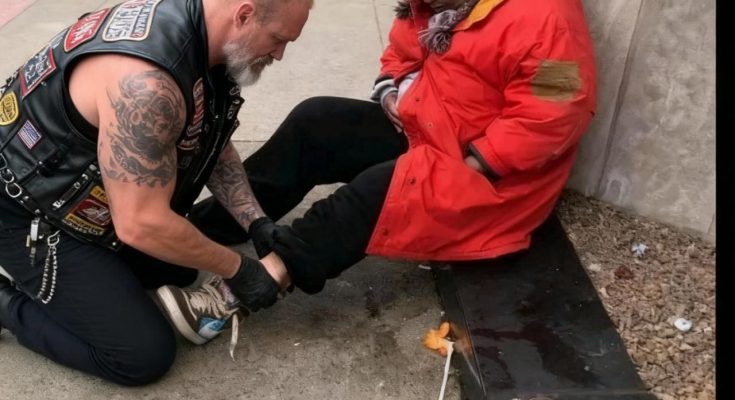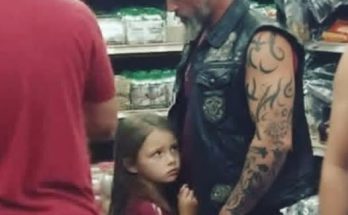For seven years, I’ve walked the same patrol route downtown. Same blocks. Same trouble spots. Same familiar faces. But every now and then, something happens that shifts the whole landscape of what you think you know about people. For me, that shift began with a barefoot woman in a red coat… and a biker who refused to give up on her.
Her name is Miss Rose. At least that’s what the locals call her. Seventy-something, tiny as a sparrow, always wrapped in the same faded red coat. She’s been sitting on the same street corner for as long as I’ve been on this beat — through heat waves, blizzards, and everything in between. And though people bring her food, blankets, even socks, she’s almost always barefoot, or wearing shoes so destroyed they barely hold together.
Dozens of people have tried to help her. She accepts the kindness, the food, the blankets. But never the shoes. Not once.
Then came the biker.
Big guy. Leather vest. Gray beard like steel wool. Tattoos creeping up his neck. He started showing up every Tuesday at exactly 9 AM, carrying a new shoebox. Not cheap shoes — good ones. Nice ones. Quality. He’d kneel down, offer them with a gentle voice that didn’t match his rough appearance… and every time, she turned him down.
Three months straight. Every Tuesday. He kept coming back.
One freezing February morning — fifteen degrees, wind slicing through my uniform — I finally approached him.
“You’re wasting your time,” I said. “She never takes them.”
He looked up at me with these clear, steady blue eyes. “I know she’s not going to take them. Not yet.”
“Then why keep trying?”
“Because she hasn’t told me why. And until she tells me why, I’m not done.”
He walked past me and sat beside her on the ice-cold sidewalk, as if the concrete didn’t bother him at all.
“Good morning, Miss Rose,” he said softly. “I brought you something.”
She gave him that sad little smile she always gave everyone who offered shoes. “Baby, I can’t take those. Keep them for someone who needs them.”
“You need them,” he said. “And you’re freezing.”
“Doesn’t matter,” she whispered. “I can’t wear new shoes. I just can’t.”
He didn’t push. He didn’t act frustrated. He just sat down next to her, pulled out a thermos, and poured her a cup of hot coffee.
“At least tell me why,” he said. “I’ll stop asking if you tell me why.”
Miss Rose hesitated, her hands shaking around the warm cup. Finally, she nodded.
“It’s a long story,” she murmured. “And you’ll think I’m crazy.”
“I won’t.”
She stared at her battered shoes — duct tape, holes, no laces — and said quietly, “These are the first shoes I ever bought with my own money.”
The biker didn’t flinch. He just listened.
“I grew up poor in Alabama,” she said. “Dirt poor. We went barefoot most days. When I was seven, I stepped on a rusty nail. Went right through my foot. Got infected. We didn’t have a doctor. Mama wrapped my foot in rags and prayed.”
She took a shaky breath.
“When I was twelve, the church gave out donated shoes. None were my size. My feet bled for months until the leather finally softened. I swore that one day — one day — I’d buy a pair that actually fit.”
She swallowed hard, her voice cracking.
“I had my first baby at sixteen. Daddy kicked me out. I walked from Alabama to Tennessee barefoot. Two hundred and forty miles. My feet were bleeding the whole time. And I lost the baby halfway there.”
The biker gently placed a hand over hers. Miss Rose kept talking.
“I worked for forty-three years after that. Cleaning houses. Washing dishes. Whatever I could get. Every penny went to keeping my other kids fed. I wore whatever shoes I could find in trash cans or donation bins.”
Her lips trembled.
“When my youngest graduated high school — the first in my family — I had fifty-seven dollars left after bills. I walked into a shoe store for the first time in my life. Tried on every pair they’d let me. I picked these red sneakers. Forty-three dollars.” She lifted her foot. “These ones right here.”
The biker stared at them like holy relics.
“That was thirty-eight years ago,” she whispered. “Only shoes I ever bought for myself. The only thing in my whole life that was really mine.”
She wiped her cheeks. “I know people think I’m crazy. I know they’re falling apart. But if I throw them away… it’s like throwing away proof that I mattered. That I was worth something. Shoes ain’t just shoes to me.”
The biker nodded slowly, then said, “Can I tell you something too?”
Miss Rose nodded.
“I’m Thomas. Sixty-six. And I’ve been sober thirty-eight years. Same amount of time you’ve had those shoes.”
He unzipped his leather vest and revealed a worn, patched-up jacket.
“This jacket saved my life,” he said. “A stranger gave it to me when I was homeless and drinking myself to death. He saw me as human when no one else did.”
He swallowed hard.
“I wore it long after I got sober. Long after I got a job. Long after I could buy ten new jackets. I couldn’t let go. Because it wasn’t a jacket. It was the moment someone believed I could be more.”
He looked into her eyes.
“I understand holding on to something because it’s the only thing that ever told you you mattered.”
Then he opened the shoebox.
Inside was a pair of brand-new sneakers — bright red. Size eight and a half.
“I’m not asking you to replace the past,” he said. “I’m asking you to let the past rest. Let me take your old shoes to a cobbler. I’ll have them preserved — mounted in a case. You’ll have them forever. But you’ll also have warm feet.”
Miss Rose sobbed. Not quiet tears — but decades of hurt coming up all at once.
And for the first time in five years, she said yes.
Thomas unlaced her destroyed shoes like he was handling something sacred. He wiped her feet gently with a warm cloth he’d brought. He put soft socks on her swollen feet. Then the new shoes.
She stood.
“They fit,” she whispered. “Just like the first pair.”
“They should,” he smiled. “I asked your size three months ago.”
Two weeks later, he returned with her old shoes sealed in a glass case, plaque and all. She kept it in her cart like a treasure.
Four years have passed. Thomas still comes every Tuesday morning with coffee and conversation. Miss Rose finally agreed to live in a shelter — but only after he found one that would let her keep her belongings, including that case.
People think the story is about shoes.
It’s not.
It’s about dignity. About being seen. About the kind of love that doesn’t quit — the kind that sits on a frozen sidewalk and listens until someone’s truth finally comes out.
Thomas kept showing up until she felt safe enough to tell her story.
And because he did, everything changed.



